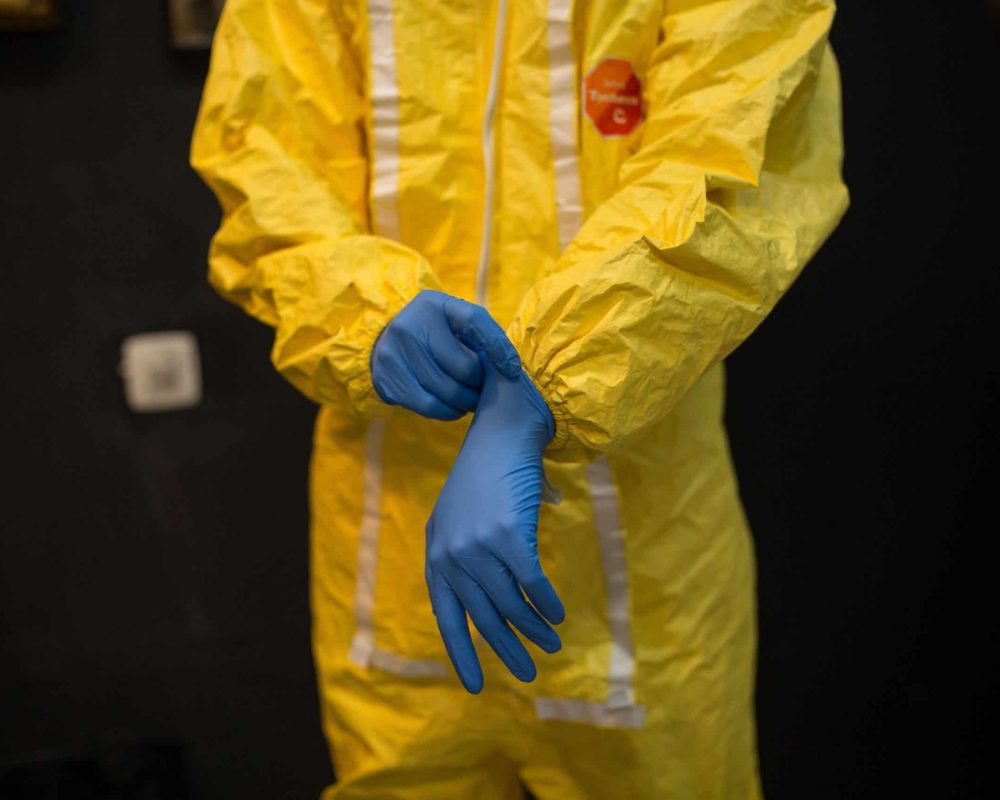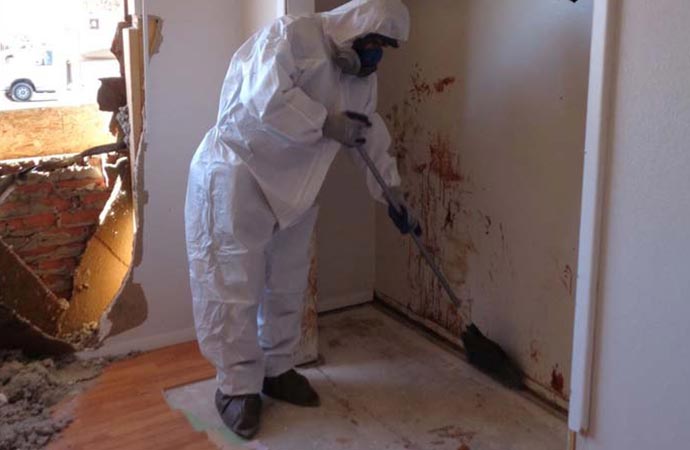Specialist Biohazard Cleaning and Decontamination for Blood, Bodily Fluids, and Hazardous Products
The possible health and wellness threats associated with exposure to biohazards emphasize the crucial demand for meticulous handling and extensive cleaning. As we browse the elaborate landscape of biohazard clean-up, recognizing the nuances of guidelines, conformity, and the specialized equipment at play ends up being imperative in guaranteeing a risk-free and complete decontamination procedure.
Wellness Threats of Biohazard Exposure
Exposure to biohazards positions considerable health dangers that can lead to serious effects for people and areas alike. Biohazards encompass a variety of organic substances, including blood, bodily fluids, mold, bacteria, viruses, and other potentially infectious products. When people come right into call with these biohazards, whether with mishaps, incorrect handling, or ecological exposure, they face the risk of contracting serious health problems or conditions.
Among the key wellness threats related to biohazard direct exposure is the transmission of contagious conditions. Bloodborne microorganisms such as HIV, hepatitis B and C, and different bacteria can be present in biohazardous products, posturing a straight risk to human health. Inhaling air-borne biohazards like mold spores or entering into contact with contaminated surfaces can additionally cause breathing issues, allergic reactions, and various other unfavorable health effects.
Furthermore, biohazard direct exposure can have long-lasting health effects, with some illness manifesting years after the first get in touch with (Blood Cleanup). For that reason, it is essential to focus on appropriate biohazard cleansing and purification to mitigate these wellness risks and make certain the security of individuals and areas

Specialized Educating for Biohazard Cleaning
When it concerns managing biohazard cleanup effectively and securely, specialized training plays a basic role in guaranteeing correct purification procedures are followed. Biohazard clean-up calls for details knowledge and skills to effectively alleviate threats connected with bloodborne pathogens, bodily fluids, and dangerous products. Specialists learnt biohazard cleaning undertake rigorous guideline on just how to securely handle, remove, and throw away biohazardous products to stop contamination and direct exposure.
Specialized training for biohazard cleaning covers a variety of essential topics, consisting of appropriate individual safety devices (PPE) usage, bloodborne microorganism understanding, decontamination techniques, and dangerous waste disposal protocols. Individuals learnt biohazard clean-up are furnished with the needed experience to analyze contamination degrees, recognize prospective risks, and execute suitable cleanup treatments in compliance with regulatory standards.
Continual training and education and learning are vital in the field of biohazard cleanup to stay upgraded on the most up to date decontamination technologies, safety and security procedures, and guidelines. By purchasing specialized training, biohazard cleanup specialists can successfully respond to emergency situation clean-up circumstances and safeguard both public wellness and the atmosphere.
Importance of Correct Decontamination Techniques
Using proper purification methods is crucial in biohazard cleaning to efficiently minimize and get rid of hazardous products health and wellness risks. Effective purification not only makes certain the elimination of noticeable traces of blood, bodily fluids, and various other biohazards however additionally targets unseen pathogens that may pose severe health and wellness risks otherwise appropriately gotten rid of. By adhering to strict purification protocols, trained experts can substantially minimize the threat of exposure to unsafe bacteria, infections, and bacteria that might result in diseases or infections.
Proper decontamination strategies involve using customized devices and disinfectants that are especially designed to counteract biohazards efficiently. Complete cleansing and sanitation of polluted locations are vital to stop the spread of microorganisms and guarantee a risk-free setting for residents. Additionally, the right disposal of biohazardous waste adhering to purification treatments is essential in avoiding contamination of other surfaces or people.

Devices and Tools for Safe Clean-up
When dealing with blood, physical fluids, or harmful materials, biohazard cleansing specialists rely on specialized equipment to reduce direct exposure risks and thoroughly decontaminate the affected location. Additionally, biohazard cleaning packages having disinfectants, absorptive More Info materials, and biohazard bags are utilized to securely consist of and dispose of polluted products.
Advanced cleaning devices like hospital-grade disinfectants, HEPA-filtered vacuums, and fogging makers are used to sanitize surfaces and eliminate biohazards efficiently. Specialized equipment such as sharps containers and biohazard waste disposal containers are utilized to securely handle sharp items and biohazardous waste materials. By making use of the appropriate tools and devices, biohazard cleansing specialists can make sure a detailed clean-up process that prioritizes safety and reduces wellness threats for both employees and passengers of the affected space.
Laws and Conformity in Biohazard Cleaning
Correct adherence to regulations and conformity standards is critical in biohazard cleansing to guarantee the safety of both personnel and the atmosphere. Federal government firms such as OSHA (Occupational Safety and Health Management) and the EPA (Epa) have actually developed details guidelines for biohazard cleanup treatments to decrease health risks and environmental contamination. These laws cover a series of elements including the handling, transportation, and disposal of biohazardous products, along with the necessary training and protective devices needed for employees associated with the clean-up process.
Biohazard cleaning firms have to stay up-to-date with these laws to ensure that their procedures satisfy the needed security requirements. Failing to follow these policies can cause serious repercussions, consisting of penalties, lawful activity, and endangering the health of individuals and the setting. By following rigorous regulations and compliance procedures, biohazard cleaning firms can properly reduce threats and guarantee a detailed and secure cleanup procedure for all celebrations involved.
Final Thought
In verdict, biohazard cleansing and decontamination need customized training, proper strategies, and adherence to guidelines. Direct exposure to blood, physical fluids, and dangerous materials postures considerable health dangers, making blog it crucial to utilize the ideal equipment and devices for secure clean-up. By complying with click reference stringent methods and guidelines, experts can efficiently minimize the risks linked with biohazard direct exposure and ensure the security of both themselves and others.
As we navigate the intricate landscape of biohazard clean-up, comprehending the subtleties of policies, compliance, and the specialized devices at play becomes imperative in making sure a secure and detailed decontamination process. (Blood Cleanup)
When it comes to taking care of biohazard clean-up efficiently and safely, specialized training plays a basic function in making certain appropriate decontamination procedures are followed.Utilizing correct purification methods is vital in biohazard clean-up to properly reduce and eliminate dangerous materials health risks. Additionally, biohazard cleansing packages including disinfectants, absorbent materials, and biohazard bags are utilized to securely consist of and get rid of of polluted things.
Government companies such as OSHA (Occupational Safety And Security and Wellness Management) and the EPA (Environmental Security Firm) have actually established certain guidelines for biohazard cleanup procedures to minimize wellness dangers and environmental contamination.